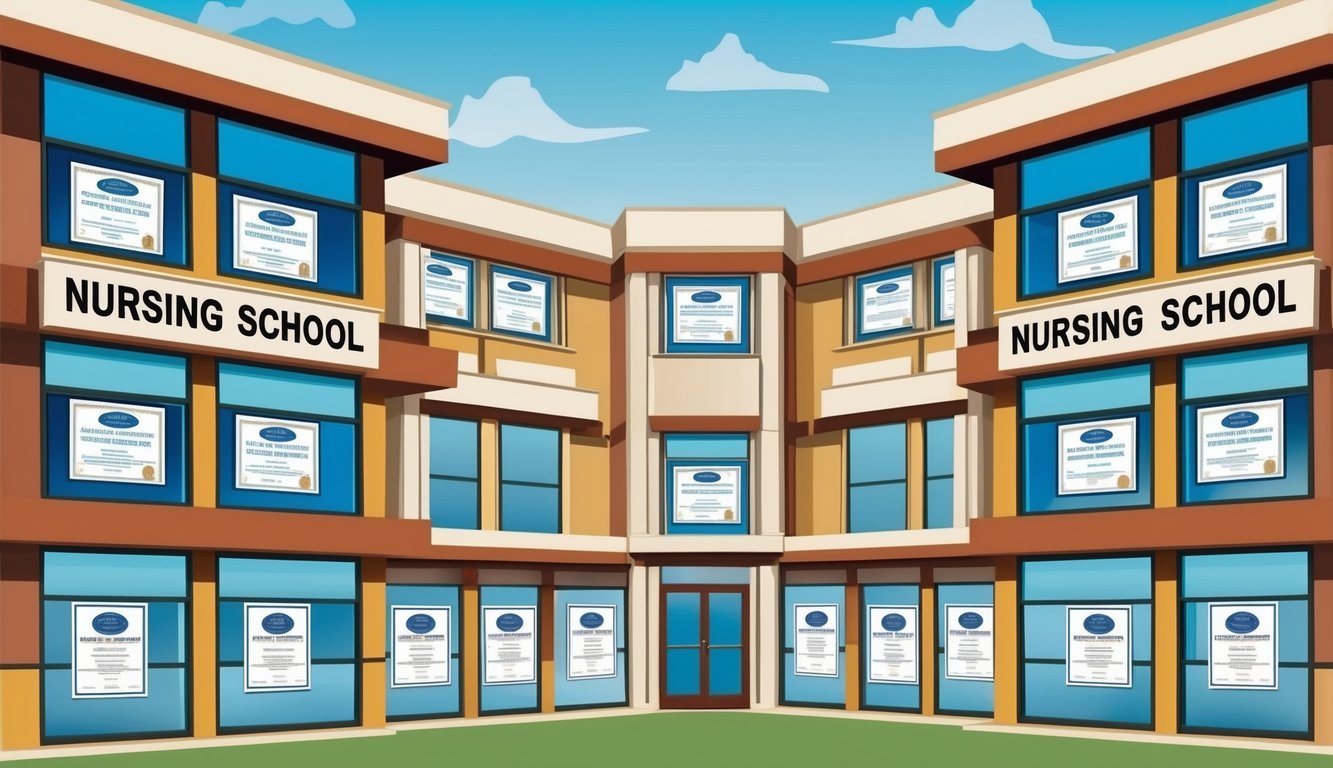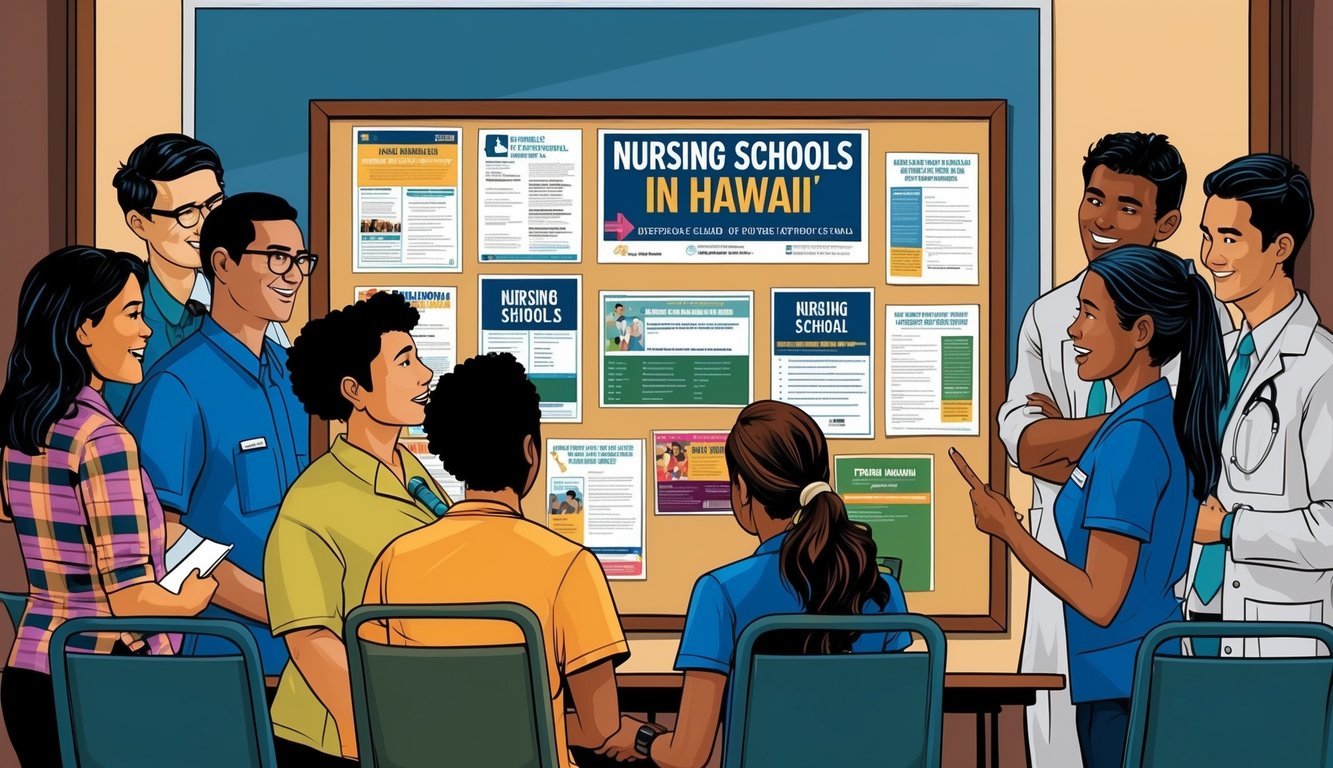Pursuing a nursing career in Hawaii offers unique opportunities and experiences, making it an attractive choice for aspiring nurses. Hawaii has several reputable nursing schools that provide various programs, from associate degrees to advanced practice nursing degrees. These institutions help shape compassionate and skilled nursing professionals ready to serve diverse populations.
Nursing schools in Hawaii emphasize hands-on learning and clinical experience, which are essential for success in this field.
Graduates from these programs often enjoy promising career prospects in a state with a growing demand for qualified nurses.
Whether you aim for a traditional nursing degree or consider online and accelerated options, the choices are abundant.
As you explore your options for nursing education, you’ll discover the significance of accreditation and licensing requirements in Hawaii.
This information will help you make informed decisions about your path to becoming a nurse in this beautiful region.
Key Takeaways
- Nursing schools in Hawaii offer various degree programs to fit your goals.
- Hands-on training is emphasized, preparing you for real-world nursing challenges.
- Accreditation and licensing are crucial for a successful nursing career in Hawaii.
Exploring Nursing Schools in Hawaii
Hawaii offers a variety of nursing schools that cater to different needs and academic goals.
This section explores three notable institutions where you can pursue a nursing degree, each providing unique opportunities and programs.
University of Hawaii at Manoa
The University of Hawaii at Manoa is a leading institution for nursing education in the state.
It offers a comprehensive Bachelor of Science in Nursing (BSN) program and a Master’s program.
The School of Nursing focuses on a mix of theoretical knowledge and practical skills.
Students have access to state-of-the-art facilities and experienced faculty.
BSN graduates at this university have an impressive NCLEX passing rate.
They also provide research opportunities in various nursing specialties, enhancing the learning experience.
Hawaii Pacific University
Hawaii Pacific University also ranks among the best nursing schools in Hawaii.
Its nursing program emphasizes hands-on training with clinical experiences in local healthcare facilities.
You can earn both your BSN and MSN degrees here, catering to different levels of nursing education.
Students benefit from small class sizes, which foster personalized learning.
The program prepares graduates to excel in diverse healthcare settings.
The university has strong partnerships with local hospitals, providing excellent internship opportunities.
Chaminade University of Honolulu
Chaminade University of Honolulu offers a unique approach to nursing education.
The nursing program focuses on ethical care and community service.
Its BSN program is designed for students pursuing a holistic education in nursing.
Students can expect a supportive environment with experienced instructors.
Chaminade’s NCLEX passing rates are competitive, reflecting the quality of education.
The university also promotes service learning, allowing you to engage with the community while gaining valuable experience.
In addition to these three institutions, other schools like Kapiolani Community College and University of Hawaii at Hilo provide nursing programs that cater to diverse student populations.
You have plenty of options to find a program that suits your career goals in nursing.
Nursing Degrees and Programs
Nursing education provides various pathways to become a registered nurse or advance your career.
Understanding the different nursing degrees and programs available in Hawaii can help you make informed decisions about your future in healthcare.
Bachelor of Science in Nursing (BSN)
The Bachelor of Science in Nursing (BSN) program typically takes four years to complete.
This degree prepares you for a career as a registered nurse and covers essential subjects such as anatomy, physiology, and pharmacology.
In Hawaii, several institutions offer BSN programs.
These programs often include clinical practice, which is crucial for developing hands-on skills.
A BSN may also be required for specialized roles, like nurse practitioners or leadership positions in healthcare.
Graduates of BSN programs often find better job prospects and higher salaries.
Associate Degree in Nursing (ADN)
An Associate Degree in Nursing (ADN) is usually a two-year program.
This degree allows you to sit for the NCLEX-RN exam to become a registered nurse.
The ADN focuses on core nursing skills and practical experience.
In Hawaii, ADN programs are often offered at community colleges.
The cost for these programs generally ranges from $3,000 to $6,000 annually for in-state students.
Completing an ADN can be a quicker way to enter the workforce, but some employers prefer BSN graduates.
You can also choose to continue your education later to earn a BSN.
Advanced Nursing Degrees
Advanced nursing degrees include options such as a Bachelor of Science in Nursing (BSN) to Doctor of Nursing Practice (DNP) pathway.
These degrees allow you to specialize in areas like nurse practitioner roles, clinical nurse specialist, or nurse educator.
Many programs in Hawaii provide opportunities for further education.
Advanced degrees often include leadership training and advanced clinical practice.
With these qualifications, you can take on more complex patient care roles, conduct research, or teach future nurses.
Completing a DNP can also prepare you for high-level positions in healthcare administration.
Licensing and Accreditation

Understanding the licensing and accreditation requirements is essential for your nursing career in Hawaii.
This section covers the critical aspects of exam preparation and the accreditation statuses you should look for in nursing programs.
NCLEX-RN and Licensure Exam Preparation
To become a registered nurse in Hawaii, you must pass the NCLEX-RN exam.
This test evaluates your knowledge and skills necessary for safe nursing practice.
Preparation involves reviewing topics relevant to nursing care and patient safety.
Your nursing program should include comprehensive preparatory courses to help you succeed.
Many schools offer practice tests and resources to enhance your exam readiness.
NCLEX-RN Pass Rates in Hawaii:
| School Name | NCLEX-RN Pass Rate |
|---|---|
| School A | 98% |
| School B | 90% |
| School C | 95% |
After passing the exam, you need to apply for your Hawaii nursing license through the Hawaii Board of Nursing.
Ensure you complete all required documentation and fees for a smooth application process.
Accreditation and Approval
Accreditation is vital for ensuring your nursing program meets industry standards.
In Hawaii, look for programs accredited by recognized bodies like the CCNE (Commission on Collegiate Nursing Education).
Programs lacking proper accreditation may not qualify you for licensure.
The following table summarizes key accreditation aspects:
| Accreditation Type | Description |
|---|---|
| CCNE Accredited | Recognizes programs that meet high educational standards. |
| ACEN Accredited | Focuses on the quality of nursing education at the associate level. |
Being part of an accredited program can enhance your employability and may be a requirement for further education.
Always check with prospective schools to ensure they have the appropriate approval from the Hawaii Board of Nursing.
Career Prospects in Nursing

The nursing field offers many opportunities and pathways for career growth.
As you consider a career in nursing, understanding the employment landscape and options for further education will be key to your success in Hawaii.
Employment Opportunities
In Hawaii, the demand for nurses is strong.
The job market is projected to grow by 7% through 2029.
Many healthcare organizations are actively seeking skilled professionals to fill roles.
- Registered Nurses (RNs) play a crucial role in patient care across various settings such as hospitals, clinics, and community health centers.
- The average salary for registered nurses in Hawaii is approximately $84,000 per year, though it can vary based on experience and location.
Nursing students can find internships and entry-level positions that will help provide valuable experience.
Many graduates receive job offers soon after completing their degree programs.
Continuing Education and Advancement
Continuing education is vital for advancing your career in nursing.
You can explore programs like RN to BSN to increase your qualifications and job prospects.
- Many schools offer online or part-time options to fit your schedule, such as those listed on RN Careers.
- Advanced practice roles, such as Nurse Practitioner or Clinical Nurse Specialist, typically require additional education and training.
By investing in your education, you can enhance your career opportunities within the nursing profession in the Aloha State and beyond.
Advanced Nursing Education

Advanced nursing education provides you with specialized knowledge and skills needed to excel in the nursing field.
Programs such as the Master of Science in Nursing (MSN) and Doctor of Nursing Practice (DNP) prepare you for advanced roles in patient care and management.
Master of Science in Nursing (MSN)
The Master of Science in Nursing (MSN) program is designed for registered nurses wanting to enhance their skills and knowledge.
This degree often focuses on specialized areas such as family nurse practitioner or adult-gerontology acute care nurse practitioner.
You will engage in rigorous coursework that includes evidence-based practice and advanced clinical skills.
Many MSN programs also offer accelerated options for those who hold a Bachelor of Science in Nursing (BSN).
Admission requirements usually include a current RN license and a bachelor’s degree in nursing.
Programs such as the University of Hawaii at Manoa provide both online and on-campus formats, which can accommodate your busy schedule.
Doctor of Nursing Practice (DNP) Programs
The Doctor of Nursing Practice (DNP) is a terminal degree that prepares you for clinical leadership roles.
This program provides advanced training in both clinical practice and healthcare policy.
DNP programs often emphasize evidence-based practice and application of research in real-world settings.
You will learn how to implement best practices and improve patient outcomes.
Many DNP programs require a previous MSN or a related master’s degree to enter.
They also often include a capstone project focused on improving healthcare delivery.
You can explore available programs at institutions like Hawaii Pacific University for more information on their offerings.
Frequently Asked Questions

This section addresses common inquiries regarding nursing programs in Hawaii.
Here, you can find important details about admission requirements, accredited universities, program duration, costs, acceptance rates, and accelerated options.
What are the admission requirements for nursing programs in Hawaii?
Admission requirements can vary by school, but schools generally require a high school diploma or GED.
Many programs also require prerequisite courses in subjects such as biology and chemistry.
Some schools may also ask for standardized test scores like the TEAS (Test of Essential Academic Skills).
It’s best to check with the specific institution for their exact requirements.
Which universities in Hawaii offer accredited nursing programs?
Several universities in Hawaii provide accredited nursing programs.
Notable institutions include:
| University Name | Program Type |
|---|---|
| University of Hawaii at Manoa | BSN, MSN |
| University of Hawaii at Hilo | BSN |
| Hawaii Pacific University | BSN, MSN |
Make sure the program you choose is accredited by organizations like ACEN.
What is the typical duration of nursing education in Hawaii?
Typically, an Associate Degree in Nursing (ADN) takes about two years to complete.
A Bachelor of Science in Nursing (BSN) usually takes four years.
Some universities may offer accelerated programs if you have prior college experience.
How does the cost of nursing school in Hawaii compare to other states?
Tuition for nursing programs in Hawaii varies.
For instance, ADN programs generally cost between $3,000 and $6,000 annually.
On the other hand, BSN programs can be higher, often around $7,344 per year for in-state students.
Compared to other states, costs may be moderate, but it’s wise to research tuition and fees at individual schools.
What is the acceptance rate for nursing schools in Hawaii?
Acceptance rates can vary significantly by school and program.
Some nursing programs in Hawaii have low acceptance rates due to high demand and limited spots.
Researching individual schools will provide the most accurate statistics.
Are there any accelerated nursing programs available in Hawaii?
Yes, accelerated nursing programs are available in Hawaii.
These programs cater to individuals who already hold a bachelor’s degree in another field and want to transition to nursing quickly.
Check with specific universities for details on their accelerated offerings.

